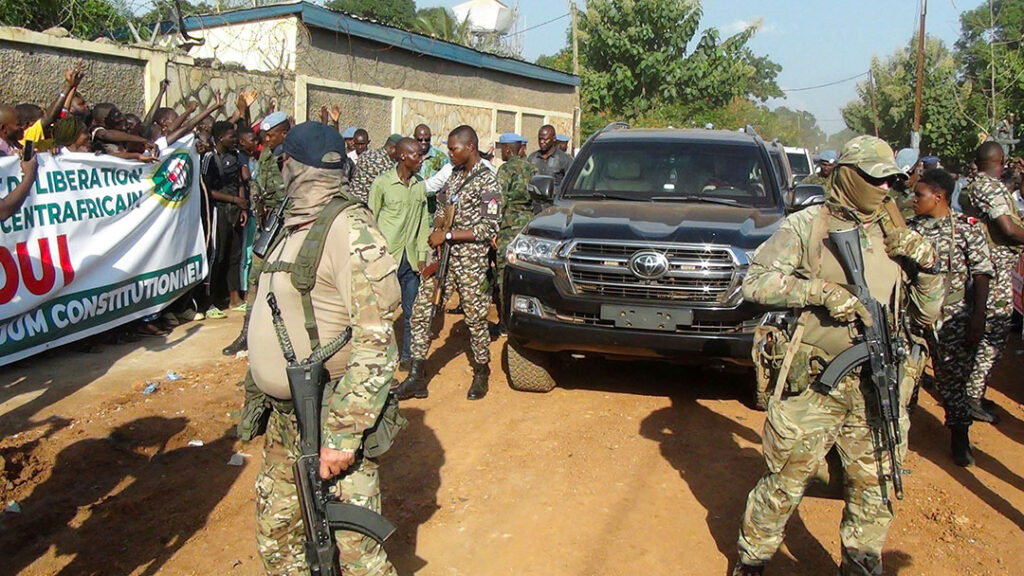The Central African Republic is in the middle of a tug of war between two Russian mercenary groups.
The Wagner Group has operated in the CAR since 2018 and remained active in the country after the 2023 death of its leader, Yevgeny Prigozhin. However, Russia’s defense ministry has pressured the country to replace Wagner with the Kremlin’s Africa Corps, which operates under the Russian defense ministry. A CAR military official said that Russia demanded that the country cover Africa Corps personnel costs and also pay millions of dollars to Moscow.
“But authorities in Bangui said they are unable to pay the amount,” said the official, who spoke anonymously to The Associated Press. “Instead, they hope to compensate Russia with strategic and mineral resources, notably gold, uranium, and iron,” a model that does not drain its cash-strapped treasury.
Russia demanded the shift to Africa Corps and payment for its services during several visits to the CAR earlier this year. The CAR official said government authorities also believe the autonomous Wagner Group will be more effective than Africa Corps. Bangui has praised Wagner’s combat performance and local knowledge, saying the mercenaries understand the country’s terrain and deliver results.
Wagner fighters have acted as CAR President Faustin Archange Touadéra’s personal security detail since their arrival. They helped him change the Constitution by referendum in July 2023, which allowed him to stay in power indefinitely. Wagner also is accused of committing human rights violations, including executions and sexual violence against civilians. Because Wagner is a private company, Russia claimed it was not responsible for these actions. However, as the Timbuktu Institute noted, the transition to Africa Corps ends Russia’s plausible deniability.
“Politically, President Touadéra’s inner circle trusts Wagner’s men, who have ‘connections with [CAR] officers’ and a fearsome reputation on the ground,” the Robert Lansing Institute for Global Threats and Democracies Studies wrote in an October 7 report. “There is concern that swapping in a formal Russian unit could upset the delicate balance that keeps the regime in power.”
Africa Corps consists of members of Russia’s Army and former Wagner fighters. Its efforts are inspired by Wagner. However, CAR officials view Africa Corps as untested and focused on training rather than frontline fighting. Africa Corps personnel typically are paired with state-owned companies to hunt for mining, oil and port deals in countries such as Burkina Faso, Libya, Mali and Niger.
As the Lansing Institute noted, the Kremlin’s new strategy is geopolitically driven. As Russia’s war with Ukraine grinds on, Moscow is leveraging its continental allies and assets to bypass Western sanctions, win United Nations votes, secure raw materials and recruit fighters.
“The Africa Corps approach is also low-cost and low-risk from Russia’s perspective, relying on relatively small deployments and influence operations (propaganda, military training) to yield outsized strategic dividends,” the Lansing Institute reported.
Bangui’s continued resistance risks angering Moscow and being left to defend itself. This is a risk, as CAR rebel groups are active, violent and deadly. The country also is dealing with a wave of violent protests over Wagner’s ongoing presence. A compromise, such as allowing a gradual transition to Africa Corps or paying Russia with more resources, is possible. However, the Lansing Institute noted that Russia already has “forced” Mali to embrace Africa Corps.
“The CAR episode underscores a larger tension: African states embracing foreign security patrons to prop up regimes, at the risk of sovereignty,” the Lansing Institute wrote. “Russia’s new model — formal agreements, bases, and direct command — could further erode host nations’ autonomy, effectively embedding Russian forces indefinitely under the banner of ‘training missions’ or bilateral pacts.”

